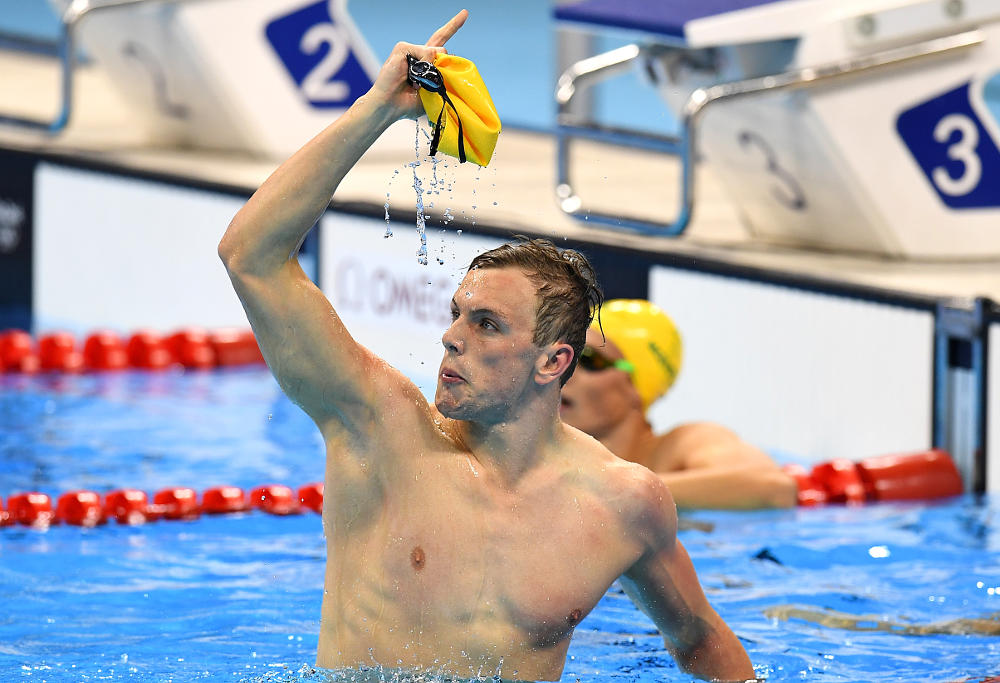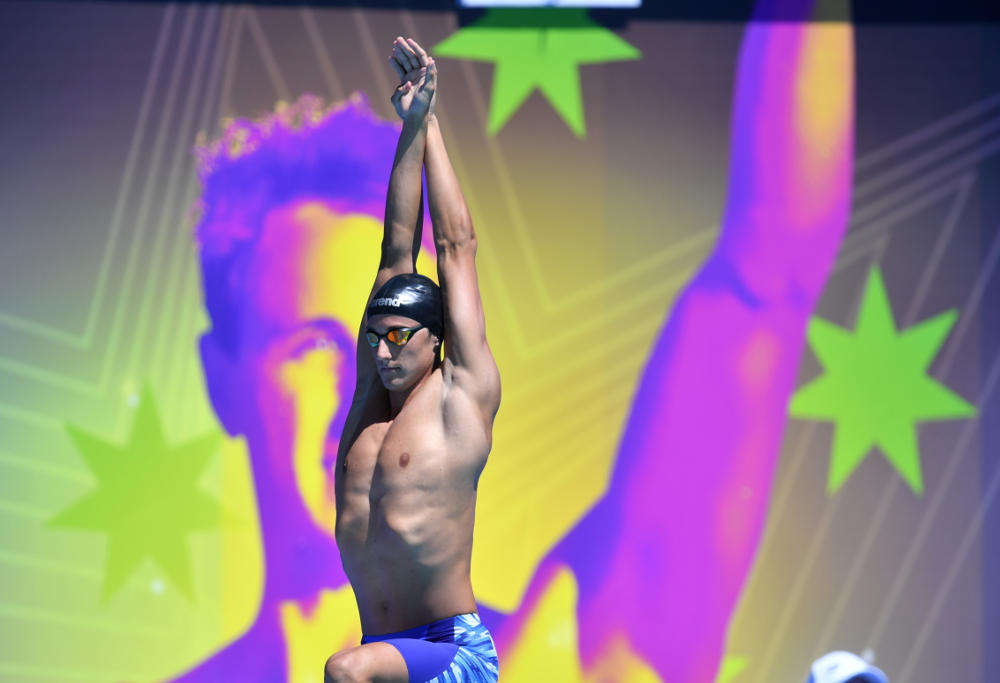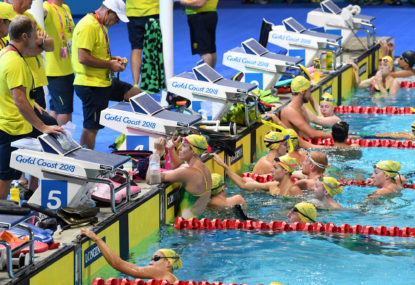Swimming is, without doubt, one of Australia’s most successful sports when it comes to events like the Commonwealth Games, and the team for the Gold Coast 2018 edition is brimming with medal chances.
With a team of 70 swimmers, Australia will be aiming to match their 57-medal hall from Glasgow in 2014, when they dominated in the pool.
Here are the best chances for the Aussies.
More Commonwealth Games
» About the Commonwealth Games
» Full 2018 Commonwealth Games events schedule
» How to watch the 2018 Commonwealth Games online or on TV
Georgia Bohl (women’s 50m, 100m, 200m breaststroke)
Bohl is the current long course national champion over 100 metres in the breaststroke and finished on the podium for both the 50 and 200-metre events.
While those times didn’t make for amazing reading, she will challenge in all three events on the Gold Coast.
Bohl’s time was a handful of seconds outside world record pace, but on the Commonwealth stage without the likes of the USA’s Lilly King and Russia’s Yuliya Yefimova, her biggest challenge will be others from down under like Taylor McKeown.
Bronte Campbell (women’s 50m, 100m freestyle)
The two sprint freestyle races in the women’s programme, all going to plan, will be shared by the Campbell sisters.
Bronte is the freestyle specialist and will be looking to outdo her sister, other Aussie competition and the international opponents.
At times, Bronte has disappointed on the big stage; at the Rio 2016 Olympics, she failed to win an individual medal.
Cate Campbell (women’s 50m, 100m freestyle, 50m butterfly)
Like Bronte, everything turned to mush at the Rio 2016 campaign. More frustratingly, Cate proved she was in great form by setting Olympic records in both the heats and semi-final of the 100-metre freestyle.
Unsurprisingly, she is the current national champion over 100 metres, edging out Bronte at the trials and will be aiming to hold that advantage.
It’s also not outside the reals of possibility for Campbell to win the 50-metre butterfly either after taking the Nationals by almost half a second.
Kyle Chalmers (men’s 100m, 200m freestyle)
Chalmers might be just 19 years of age, but he already has a Medal of the Order of Australia to his name, to go with a staggering gold medal at the 2016 Rio Olympics.
While Chalmers is too young to have any Commonwealth Games experience behind him, he has one of the quickest ever times over 100 metres in the post-supersuit era.
At the National Championships, he cruised home to take gold by more than half a second in the 100 metres, while he defeated Mack Horton narrowly in the 200.
Both times would have had him at the pointy end of the Worlds, had he competed at the back end of last year.

(AAP Image/Dean Lewins)
Ellie Cole (women’s para-sport S9 100m freestyle)
Whether it’s basketball or swimming, Cole has done it all in the world of para-sports. After cruising to victory in the S9 100-metre freestyle at the National Championships, she will be looking to do the same in the Commonwealth Games.
While she will face stiff competition, most notably from Lake Patterson who has been a stalwart of Australian para-swimming, Cole should go in the favourite on the back of some hot form.
Timothy Disken (men’s para-sport S9 100m freestyle, S9100m breaststroke)
Disken’s favoured event on the Gold Coast will be the freestyle, where he is the current Olympic champion. After beating the rest of the field in Rio de Janiero, he became national champion in both freestyle and breaststroke at the recent championships.
Anything less than a medal would be a disappointing campaign for Disken.
Mack Horton (men’s 200m, 400m, 1500m freestyle)
Horton, once he got over the craziness of the 2016 Olympics and his so-called scandal with Chinese swimmer Sun Yang, has been back to his best.
The 1500-metre event is widely considered the one he is almost destined to win, but it’s worth noting he is reigning Olympic champion in the 400.
Without Yang in his way, Horton will go in as 400 and 1500-metre favourite. He’s easily Australia’s best long-distance swimmer.
Mitch Larkin (men’s 50m, 100m, 200m backstroke, 200m, 400m individual medley)
Larkin will have an incredibly busy programme. Everything he touched at the Nationals a few weeks ago turned to medals for Larkin, who will have five individual races and a relay to contend with.
Backstroke is where his strength lies, although he just missed out on the gold in Rio.
He is one of the best backstrokers in the world, but doesn’t quite have the medal count to back him up in major events, not winning a single individual medal in 2017.
Despite that, he has Commonwealth gold, as well as World Championship gold, to his name previously, including both the 100 and 200 in 2015 and a 100-metre backstroke short course gold in 2016.
James Magnussen (men’s 50m freestyle)
Magnussen was once rated Australia’s best swimmer. It’s hardly a surprise, but he has never fully recovered after losing what was supposed to be his Olympic gold medal in the 100 metres at London, 2012.
He did bounce back to win gold in that event at the Glasgow Commonwealth Games, but this time around, he hasn’t even qualified.
‘The Missile’ is still one of the fastest swimmers on the Australian team though and with all his efforts focused on a one-lap dash as well as relays, anything is possible.
Cameron McEvoy (men’s 50m, 100m freestyle)
McEvoy might have lucked out in the 100 metres at the National Championships earlier this year, but he swam the fastest time in the heats of the World Championships for the event and only just missed out on a medal when the final was run.
Crucially, all three swimmers ahead of him were non-Commonwealth athletes, and it’s set up the 100-metre final as a dash between McEvoy and Chalmers.
In the 50-metre race, McEvoy is rightly the favourite, swimming a staggering 22.02 at the National Championships. Although he missed out on gold, there is improvement in that time.

(AAP Image/Dave Hunt)
Emma McKeon (women’s 100, 200m freestyle, 100m, 200m butterfly)
It’s going to be a hectic week in the pool for McKeon, who has four individual events listed to go with three relays.
She is the reigning Commonwealth Games 200-metre freestyle champion and it would be little surprise to see her back-up that effort on the Gold Coast after only being beaten out at the 2017 World Championships by American Katie Ledecky. In saying that, fellow Australian Arriane Titmus is on the rise and will challenge
Her other events are all good shots at medals, but more often than not it’s Aussies who stand in her way.
Emily Seebohm (women’s 50m, 100m, 200m backstroke)
Seebohm has been around for what feels like an eternity, but when you remember she made her Australian debut at the 2007 World Championships when she was just 14, it puts things into perspective.
She has gone through plenty of ups and downs throughout her career, but is the current world champion of the 200-metre backstroke and was strong in all her events at the recent Nationals.
Her form seems to be nearing its peak. To go with that, she is also looking to back up a gold medal in the 100-metre event at Glasgow 2014.
Ariarne Titmus (women’s 200m, 400m, 800m freestyle)
Over three consecutive nights at the recent Commonwealth Games selection trials, Titmus became national long course champion in the 200, 400 and 800 metres.
She is easily Australia’s best long-distance female hope and her times would have made her more than competitive at the 2017 Worlds, with the 17-year-old improving all the time.
Titmus could well be Australia’s next big swimming star and on home soil with a crowd behind her, there is no better time than now to stake her claim.
Relay teams
The relay teams will as always be strong. All the top stars who are favourites for medals in their own categories are there, with others like James Magnussen joining in.
The men’s 4×100-metre medley team shouldn’t go close to being beaten, with Chalmers joined by Larkin, Packard and David Morgan.
On the women’s side, the 4×100-metre freestyle team features both Campbell sisters and should cruise to victory.































































































